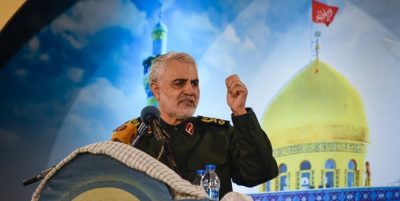Former Israeli Intel Chief Says Israel Convinced US to Kill Soleimani
The 2020 assassination brought the US and Iran to the brink of war

All Global Research articles can be read in 51 languages by activating the Translate Website button below the author’s name.
To receive Global Research’s Daily Newsletter (selected articles), click here.
Follow us on Instagram and Twitter and subscribe to our Telegram Channel. Feel free to repost and share widely Global Research articles.
***
Israel’s former military intelligence chief has said Israel convinced the US that Iranian Gen. Qasem Soleimani posed an “immediate threat” to American soldiers, the same language former President Trump used to justify his assassination at the time, although no evidence was ever provided for the claim.
Soleimani was the commander of Iran’s IRGC Quds Force and was killed in Baghdad by a US drone strike in January 2020. At the time, Tamir Hayman served as the head of Israel’s Military Intelligence Directorate. Hayman toldJewish News that Israel had provided the US with information to convince the US Soleimani posed a threat.
“We supplied the intelligence and shared analysis and over a long period of time they were eventually convinced that Soleimani was an immediate threat to American lives and its strategic posture in the Middle East,” Hayman said.
Trump told reporters at the time of the killing that Soleimani was “plotting imminent and sinister attacks on American diplomats and military personnel, but we caught him in the act and terminated him.” The claim was never confirmed, and according to then-Iraqi Prime Minister Adil Abdul-Mahdi, Soleimani was in Baghdad as part of an Iraqi mediation between Saudi Arabia and Iran.
“I was supposed to meet him in the morning the day he was killed, he came to deliver a message from Iran in response to the message we had delivered from the Saudis to Iran,” Abdul-Mahdi said after the assassination.
Trump’s justification for the assassination later changed, and members of Congress briefed on the killing said the administration provided no evidence of “imminent attacks.” In a legally mandated memo to Congress issued in February 2020, the administration dropped the “imminent attacks” claim altogether.
The memo said the assassination was done to “protect United States personnel, to deter Iran from conducting or supporting further attacks against United States forces and interests, to degrade Iran’s and Quds Force-back militia’s ability to conduct attacks, and to end Iran’s strategic escalation of attacks.”
The series of events that led to Soleimani’s assassination was sparked by a rocket attack on a base in Kirkuk, Iraq, that killed a US contractor on December 27th, 2019. The US blamed the Kirkuk attack on Kataib Hezbollah, a Shia militia the US views as an Iranian proxy.
The US responded to the Kirkuk attack by launching airstrikes on several Kataib Hezbollah targets, killing 25 of the group’s fighters. The airstrikes enraged many Iraqis, and protesters stormed the US embassy. After the embassy incident, President Trump ordered the drone strike that killed Soleimani.
The US never substantiated the claim that Kataib Hezbollah was responsible for the Kirkuk attack. In February, Iraqi intelligence officials told The New York Times that it was more likely that ISIS carried out the Kirkuk attack. ISIS would also have the motive to spark fighting between the US and Iran and the Shia militias as they were previously allied against the Sunni terror group.
The drone strike also killed Abu Mahdi al-Mohandes, who led the Popular Mobilization Forces, a group of mostly Iraqi Shia militias that was formed in 2014 to fight ISIS. The killings enraged many in Iraq and brought the US and Iran to the brink of war, but the standoff was defused after Iranian missile strikes on bases in Iraq housing US troops that didn’t result in any deaths. But to this day, Iran vows revenge for Soleimani’s death.
*
Note to readers: Please click the share buttons above. Follow us on Instagram and Twitter and subscribe to our Telegram Channel. Feel free to repost and share widely Global Research articles.
Dave DeCamp is the news editor of Antiwar.com, follow him on Twitter @decampdave.
Featured image is from American Herald Tribune

